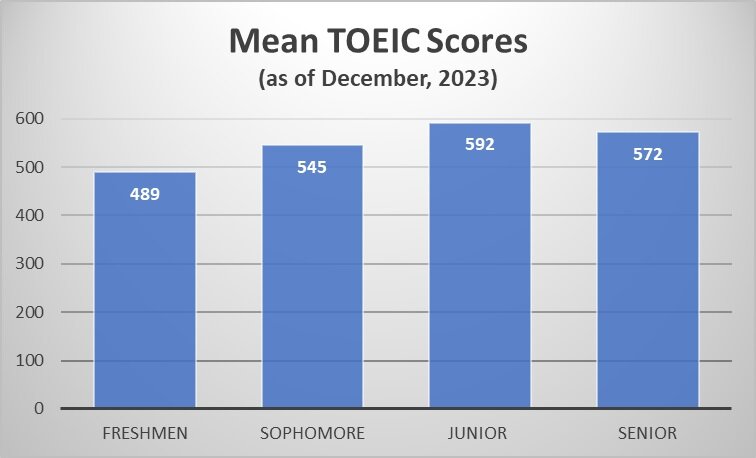The University of Aizu equips students with not only cutting-edge knowledge and skills about Computer Science and Engineering, but also with English skills that you can use for practical purposes.
Note. Items 1 through 6 below apply to students admitted via the General Selection and Recommendation-based Selection, while item 7 mainly applies to those admitted in October who belong to the Information, Communication and Technology (ICT) Global All-English Program.
1. Curriculum
All English-as-a-Foreign-Language (EFL) courses are offered in English from the very first year. The curriculum is designed to nurture the four language skills (reading, writing, listening and speaking) in a well-balanced manner. During the class, students are provided with sufficient opportunities to actually use English.
All the English classes are offered in CALL (computer assisted language learning) classrooms. The curriculum starts with teaching general English and gradually gears toward academic English, with the ultimate goal of developing English ability necessary for writing and orally presenting the graduation thesis in English.
In many other science and engineering departments in Japan, from the third year of university, EFL courses are offered as only elective courses, while at the University of Aizu, students have to take at least two EFL courses after the second year and the Thesis Writing and Presentation course in the fourth year because it is a graduation requirement to write a graduation thesis and present it in English orally.
List of English courses
https://u-aizu.ac.jp/en/curriculum/undergraduate/course-introduction/general-english/
Also refer to the syllabi.
https://web-ext.u-aizu.ac.jp/official/curriculum/syllabus/1_E_000.html
2. Fluency Program
In every first-year EFL class, there are activities to develop fluency, in which you promptly practice applying English knowledge you have acquired in high school. In this program, you don't compete against others but against your past self.
3. Extensive Reading
Extensive Reading is a learning method which is believed to make the processing of English in your brain faster by reading a large amount of simple English quickly. In the University of Aizu, all the first-year students do extensive reading.
4. TOEIC e-learning, TOEIC Preparation Course
One of the requirements to acquire the status of a third-year student is to achieve a specified score at a standardized test, the TOEIC® Listening & Reading Test. Because it is widely accepted by Japanese society as a measure of English proficiency, achieving a high TOEIC score also gives you an advantage for job hunting. At the University of Aizu, all students work on TOEIC e-learning, and you can optionally take a TOEIC Preparation Course. As a result, the mean TOEIC scores improve in the four years.

5. Professors in Charge of English Courses
Professors of various nationalities teach EFL courses, all of whom have a Ph.D. in linguistics, Teaching English to Speakers of Other Languages (TESOL), applied linguistics or related areas.
Center for Language Research https://u-aizu.ac.jp/labs/clr/people.html
6. Study-abroad programs
Compared to many other science and engineering departments of national/public universities in Japan, the University of Aizu has exceptionally rich study-abroad programs. In addition to mid-term and short-term study-abroad programs, we offer "Immersive English Experience for Study-Abroad Preparation," in which you can enjoy a mock study-abroad experience. You can choose an appropriate study-abroad program based on your needs.
More information about study-abroad https://u-aizu.ac.jp/osip/en/dispatch/
7. ICT Global All-English Program
This autumn-admission/graduation program is for those who have superb English proficiency, including international students and returnees. All the General Education and Specialized Education Courses in this program are offered in English. Those who have been admitted via the General Selection and Recommendation-based Selection are also allowed to take courses of this program if they fulfill the requirements.
ICTG Program https://u-aizu.ac.jp/sgu/en/ictg/


